
Discovering anodising
Theshed - 17/11/12 at 04:34 PM
The really great thing about this car building thing is that you get to try out new things and gain new skills.
I have had quite a few bits anodised on my car - no complaints great service very quick but...minimum charge of £75 and only one colour per batch.
So...... after many hours of browsing I thought I would give it a go at home. In short it is a doddle. I have done 2 batches so far with no real
problems.
Good fun buying sulphuric and nitric acid on the internet - I was amazed they would sell this stuff let alone send it by courier. As to that an old
PSU from a school clear out and a bit of lead flashing and bobs your uncle.
Steps are
(1) good clean with washing up liquid - polish optional
(2) Dunk in caustic soda solution for a minute - will also strip off old anodising if you leave it
(3)wash
(4) Dunk in 30-50% Nitric acid to "desmutt" - takes of all the alloying elements from the surface
(5) Wash
(6) Put it in the anodising bath - tank with cathode of lead flashing (connected to -ve) filled with 10-15% sulphuric acid. Dangle bits on well
connected aluminium welding wire - connect them to +ve of a 12v psu (yes its probably better to use a constant current supply but they cost about
£60+). Wait about 1 1/2 hours
(7) wash
(8) dunk in dye for 10-30 mins depending on the colour you want
(9) wash
(10) Seal using boiling water or proper sealer
Acids can be obtained from www.reagent.co.uk but also amazingly from ebay
Dyes and sealant from www.gaterosplating.co.uk
Distilled water in bulk from e-bay
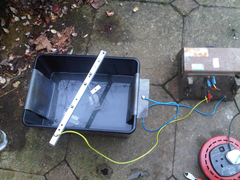

anodising tank
A poor pic of the first parts below. These are just pipe supports. They are made from 7075T6 which is not the greatest for anodising but I think they
look great.
I have a mate who hates anodising so I guess it is a matter of taste - It does stop aluminium bits getting quite so scratched
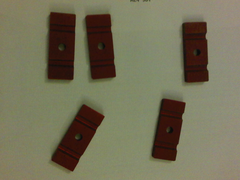

anodised bits - brake clips
NigeEss - 17/11/12 at 04:39 PM
I'm liking this 
Theshed - 17/11/12 at 04:45 PM
So was I but the missus has just come in from work and apparently this is not what kitchen pans are for.....
coyoteboy - 17/11/12 at 05:07 PM
Hmm see I had no problems when I first attempted it but since then I've had absolutely no luck doing it at all, even on parts that I know should
take quite nicely. Really confused. Especially as I had a constant current supply and was working from one a number of calculations for time and
current level. Tried all sorts of variations and couldn't nail it, yet the first time I tried with a dumb transformer and no clue as to what I
was doing it worked fine. Depressing!
jon200 - 17/11/12 at 05:20 PM
It depends what size parts your doing, the surface area. More surface area = more amps draws you you might be dropping the power supply out. We do
anodising at work and it doesn't take much to make it go pear shaped. Dye to acidic, acid not strong enough, cheap ally( this makes quite a
difference actually) I can get small things done black clear or orange if anyone wants any done? £10 per item? Obviously there can be do ferrous
metals in it or on it.
Theshed - 17/11/12 at 06:46 PM
2nd Batch now finding its home...
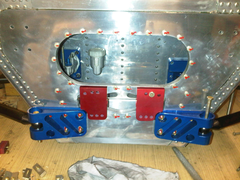

front
These bits are a little streaky - if i was fussy
Tomorrows task is to do these bits.... so this is the before
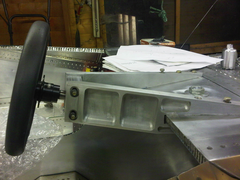

steering mount
so red or blue??? or both?
coyoteboy - 17/11/12 at 07:23 PM
quote:
It depends what size parts your doing, the surface area. More surface area = more amps draws you you might be dropping the power supply out. We do
anodising at work and it doesn't take much to make it go pear shaped. Dye to acidic, acid not strong enough, cheap ally( this makes quite a
difference actually) I can get small things done black clear or orange if anyone wants any done? £10 per item? Obviously there can be do ferrous
metals in it or on it.
Yeah I was adjusting for size and I had sterile everything and fresh dyes but the dye never took and sometimes the surface etched and greyed too. It
usually looked OK when I first pulled it out of the acid and looked that slightly yellowish clear ano'd colour, but just wouldn't accept any
colour (ok, a bit but only a tint and even after sealing it washes out).
I'll try again some time, glad to see someone's having such excellent results!
Theshed - 17/11/12 at 07:45 PM
Did the wire used to do the dangling take colour? If not might be the connection with the part. If not perhaps it was the grade of aluminium or the
dye. Just guesses cos you have just seen the extent of my experience!
[Edited on 17/11/12 by Theshed]
coyoteboy - 17/11/12 at 07:47 PM
No the wire was just as dodgy. PArt should have been fine as it's a very expensive CNC'd brake caliper that often comes in anodised form, so
I'm making the assumption that it was my process/skill rather than material fault 
Theshed - 17/11/12 at 07:54 PM
Did it fizz? If so then presumably it was anodising.
That would leave the dye - I have read loads of blogs/sites that suggest that by far the best are the professional dyes
jon200 - 17/11/12 at 07:59 PM
You want to see the fizz that comes off a 13v 350A load.
jon200 - 17/11/12 at 08:05 PM
quote:
Originally posted by coyoteboy
Yeah I was adjusting for size and I had sterile everything and fresh dyes but the dye never took and sometimes the surface etched and greyed too. It
usually looked OK when I first pulled it out of the acid and looked that slightly yellowish clear ano'd colour, but just wouldn't accept any
colour (ok, a bit but only a tint and even after sealing it washes out).
I'll try again some time, glad to see someone's having such excellent results!
Did you use a new bit if wire? Might be a poor connection meaning the current is getting dragged down.
tilly819 - 17/11/12 at 08:51 PM
I looked into this a while ago, what are you using for your dye?
Tilly
Sorry just seen the link
[Edited on 17/11/12 by tilly819]
myke pocock - 17/11/12 at 09:37 PM
Caustic soda and nitric Mmmmmmmm!!! Lovely.
fullpint - 18/11/12 at 09:46 AM
Nitric acid  We used that at my old works. 99% stuff . Poured is into the chromatetank with just a pair of thin rubber gloves on.. Safe to add acid
to water but try it the other way round and you are in trouble..
We used that at my old works. 99% stuff . Poured is into the chromatetank with just a pair of thin rubber gloves on.. Safe to add acid
to water but try it the other way round and you are in trouble..
Good result tho mate. Give it a few more goes and I'm sure you will have people knocking on your door.. Good luck with the misses tho 

coyoteboy - 18/11/12 at 07:10 PM
Connection was fine, part fizzled nicely. The dyes I used all times were dylon fabric dyes. Not perfect but first time they dyed the other parts they
were solid colour and didn't fade. Will try again soon.
Theshed - 18/11/12 at 07:16 PM
Was it very cold? Apparently that might stop the dye sticking...
Just to gloat (third batch)
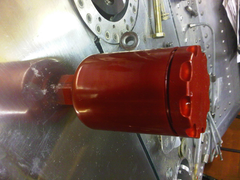

brake fluid reservoir
Theshed - 24/11/12 at 07:42 PM
Few screw ups this weekend!! The connection with the part is a big deal - cock ups go back in the caustic soda
Finished my steering mount
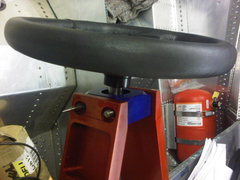

Description
fullpint - 25/11/12 at 07:56 AM
Looking good mate. You should keep up the trials and who knows what could come of it!! I've been asked several times on who does anodizing..
coyoteboy - 26/11/12 at 06:05 PM
Hmmm. Was outside. And about 12-14 degrees in the dye bath. Thinking about it, I can't remember for sure but I have a feeling I heated the dye
bath to about 40C, then boiled the parts after.
Theshed - 26/11/12 at 06:28 PM
My only stuff ups so far have been caused by poor connections. My new and improved system worked fine - forcing welding wire into turned down
aluminium bar and tapping the bar into the part. Too many bits at one go caused a lighter coating. You would need a fairly big cathode for a caliper
(if the interweb is to be believed)
coyoteboy - 26/11/12 at 07:28 PM
You using the 720 rule?
Theshed - 10/12/12 at 07:26 PM
No - I have no amp meter. Just connect up and hope. So far so good.
coyoteboy - 11/12/12 at 12:43 PM
I must be doing something catastrophically wrong then 











 We used that at my old works. 99% stuff . Poured is into the chromatetank with just a pair of thin rubber gloves on.. Safe to add acid
to water but try it the other way round and you are in trouble..
We used that at my old works. 99% stuff . Poured is into the chromatetank with just a pair of thin rubber gloves on.. Safe to add acid
to water but try it the other way round and you are in trouble.. 



